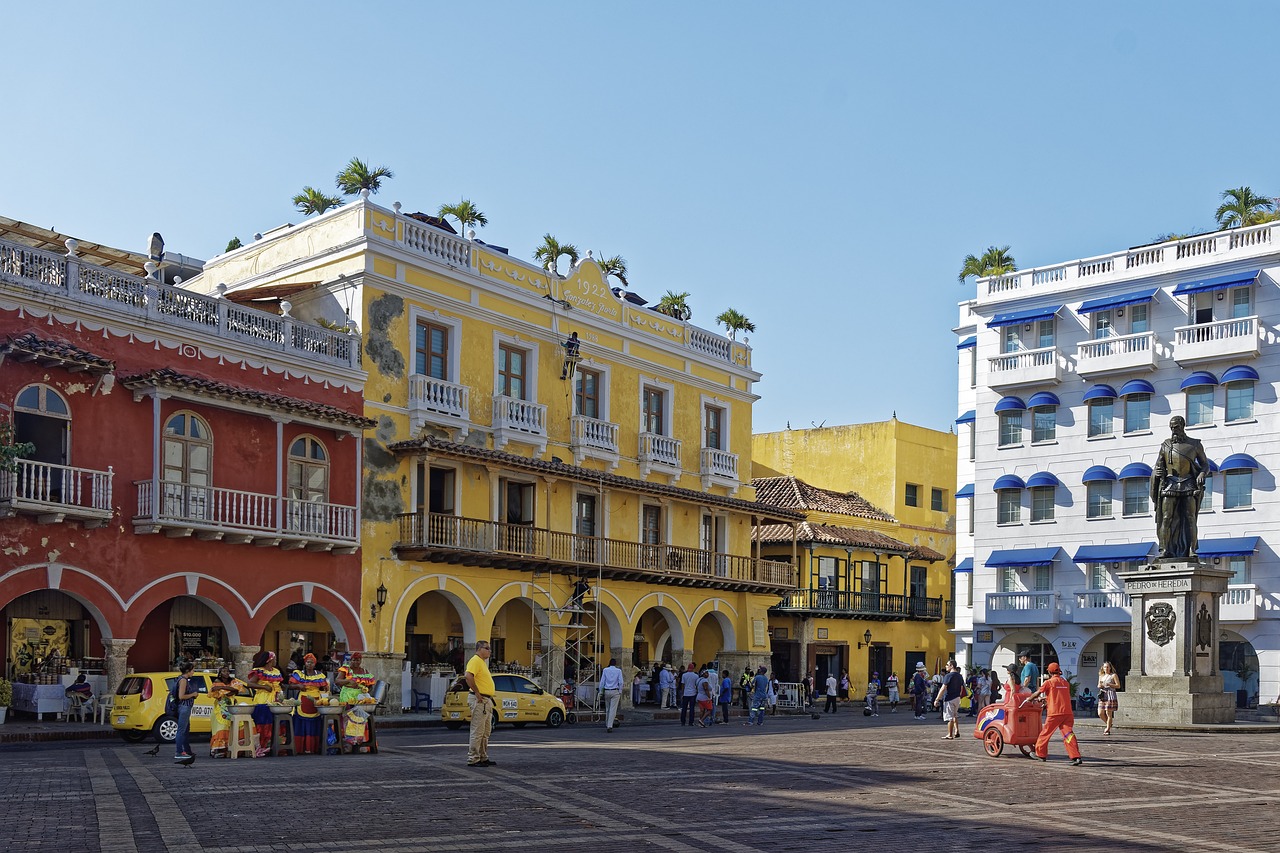17-09-2024
Tourism and HR: a shared responsability
Nelson Rivera & Sergio Rivera | Fundación Renacer - ECPAT ColombiaTo ensure that tourism is a vehicle for sustainable development and the promotion of human rights in all its forms, the actors involved, from businesses to governments, international organisations and society in general, must work together. Here is a reflection on this issue from Fundación Renacer, an organisation that works against the commercial sexual exploitation of children and adolescents.

Photography by: Urban art in Colombia. Imatge by Ursual on Pixabay
Tourism is an economic activity that, in its essence, can generate significant opportunities for the economic and social development of communities. In its complexity and multiplicity of actors, it has the possibility of generating social order processes that not only benefit a few - company shareholders, for example - but also enhance common development. However, for tourism to fulfill its true potential as an engine of development, it must focus on sustainability, ethics, and the promotion of human rights. In this context, the prevention of Commercial Sexual Exploitation of Children and Adolescents (CSEC) and the achievement of Sustainable Development Goal (SDG) 16.2 become imperative.
The World Code of Ethics for Tourism of the World Tourism Organization (UNWTO) - today a Convention - proposes that tourism is a privileged means for individual and collective development. This principle aligns with the United Nations SDG 16.1, which seeks the elimination of all forms of violence and promotes peaceful and inclusive societies. Tourism, when practiced ethically and sustainably, can contribute significantly to achieving this goal. However, for this to happen, it is essential that tourism activities promote gender equality and fully respect human rights.

Cartagena, 2015. Image by Alexander Schimmech on Flickr.
The Code of Ethics also emphasizes the importance of protecting the specific rights of the most vulnerable population groups, including children, older people, people with disabilities, ethnic minorities and indigenous peoples. Critically, ethical tourism cannot coexist with the exploitation of human beings in any of its forms and, even less so, when it affects children, since this tolerated coexistence not only violates the fundamental objectives of tourism but also constitutes a denial of its essence.
In this context, it is essential to recognize that ethical tourism committed to sustainability must strive to eliminate or reduce risk factors associated with sexual exploitation that may be directly linked to its operations or present in its environment. Unfortunately, reality shows us that tourism has sometimes become a vulnerable terrain for human trafficking and sexual exploitation. Although tourism itself is not responsible for these abuses, it does have the power and multiple opportunities to take measures to prevent them and contribute to the promotion and defense of human rights.
This implies different areas of action for tourism service providers -mainly companies-: firstly, they must promote decent, fair and equitable work, taking into account the disparities and inequities historically linked to social gender roles. At this point, a clear contradiction arises with SDG 16, which seeks to eliminate all forms of violence, since the tourism infrastructure has not escaped the reproduction of these inequalities to the detriment of the rights of women who suffer exploitation. and workplace harassment. Although tourism companies generate millions of jobs, they cannot limit themselves to hiring local labor from the towns where they operate, but must actively commit to building democratic social environments that protect children and the community in general.

Cartagena, 2016. Image by Chris GoldNY on Flickr
The contribution of companies to local development cannot focus solely on the delivery of materials and tangible goods, which, although they may contribute to mitigating some community needs, are never sufficient to counteract violence and the causes of sexual exploitation; Tourism companies must be actively involved, as social actors, in the generation and sustainability of opportunities for the social and community development of the populations in the tourist territories based on the recognition of the needs and dynamics of these populations that constitute risk factors for affectation. to human rights. This includes, first of all, its workers, who must have the possibility not only of finding means to satisfy their needs through a fair salary, but also of having opportunities for personal, family and social development.
Vital issues such as the promotion of mental health, the comprehensive well-being of families and the development of skills for managing conflicts within them - to cite a few examples - can contribute to the formation of healthier and more democratic people and communities, which results in greater labor productivity. These actions, promoted by low-cost companies, can promote compliance with human rights due diligence standards, while contributing to neutralizing potential factors of violence, which is essential to prevent and address sexual exploitation and other abuses in the workplace. context of tourism operations.
One of the obvious challenges in this process is that many tourism companies, especially in countries like Colombia, tend to be small and medium-sized, and do not have sufficient resources and infrastructure to carry out these initiatives effectively. This highlights the need to create more and better opportunities for economic growth through promotion and incentive policies from the government, but also support and cooperation exercises between companies at different levels. Alliance or association initiatives around promoting and respecting human rights in the business environment can contribute to strengthening economic development and positioning tourism companies as interested parties in the well-being of communities and the prevention of sexual exploitation.

"La Muralla soy yo" certification at a Cartagena Hotel, 2022. Image by Carla Izcara
Today, sustainable tourism has become a global trend, and many tourism companies and destinations are adopting more responsible and ethical practices. However, there is still much work to be done to ensure that tourism is a vehicle for sustainable development and the promotion of human rights in all its forms. The prevention of CSEC and the achievement of SDG 16.2 are crucial goals in this process.
To move in this direction, tourism companies, governments, non-governmental organizations and society as a whole must collaborate in an active and coordinated manner. Here, international cooperation plays a fundamental role, since tourism-related problems know no borders and require global solutions.
One of the key steps towards improving sustainable tourism and preventing CSEC is education and awareness. Tourism companies can train their staff not only in identifying possible risks of sexual exploitation and in taking measures to prevent them. In addition, they can promote awareness campaigns among tourists and their workers so that they refrain from committing any abuse and become agents of prevention by promoting attitudinal and practical changes to discourage the demand or request for sexual and sexual “services.” participation in the intermediation chains of sexual exploitation.

Wall of Cartagena, 2023. Image by RB Photo on Flickr
Tourist destinations - local government bodies that regulate tourism activities - play a crucial role in this process. They must implement policies and programs that promote ethical and sustainable tourism, including specific measures to prevent sexual exploitation. This involves establishing effective reporting and sanction mechanisms and guaranteeing supervision and compliance with established regulations.
Furthermore, it is important to promote economic diversification in tourist territories to reduce exclusive dependence on tourism as a source of income. This will help create a stronger economic foundation and prevent local communities from being pressured to tolerate abusive practices in the name of economic development.
In this context, the strengthening of small and medium-sized tourism businesses is essential. This can be achieved through training, access to finance and the promotion of good business practices. Improving the ability of these companies to operate sustainably and ethically contributes to the prevention of CSEC and the achievement of SDG 16.2.

Cartagena. Image by Makalu on Pixabay
The role of civil society and non-governmental organizations (NGOs) is fundamental in this process. NGOs can play a monitoring and reporting role, as well as providing support to victims of sexual exploitation. They can also collaborate with tourism businesses to implement corporate social responsibility programs that promote the well-being of local communities, such as codes of conduct and due diligence standards.
Ultimately, sustainable and ethical tourism is a shared responsibility. All actors involved, from tourism businesses to governments, international organizations, and society at large, must work together to ensure that tourism is a positive force that contributes to the economic development and well-being of communities, while preventing human trafficking, CSE and promoting SDG 16.2.
The main purpose of this project is to contribute to the eradication of Commercial Sexual Exploitation of Children and Adolescents - CSEC, through programmes of accompaniment and comprehensive care for victims, prevention, research, training and advice to organisations and communities, from the perspective of protection, defence and restitution of children's rights.
More Articles
-
Turismo como fuente de deshumanización
General News | 10-06-2025 -
Ecoterritorios: agroecología y turismo de proximidad
General News | 30-05-2025 -
Turismo comunitário urbano no Brasil: uma pedagogia da resistência
General News | 29-05-2025 -
¿Qué dificulta la toma de medidas frente al cambio climático en el turismo?
General News | 27-05-2025 -
Manifiesto: “A l’estiu ens hi juguem molt”
General News | 22-05-2025
